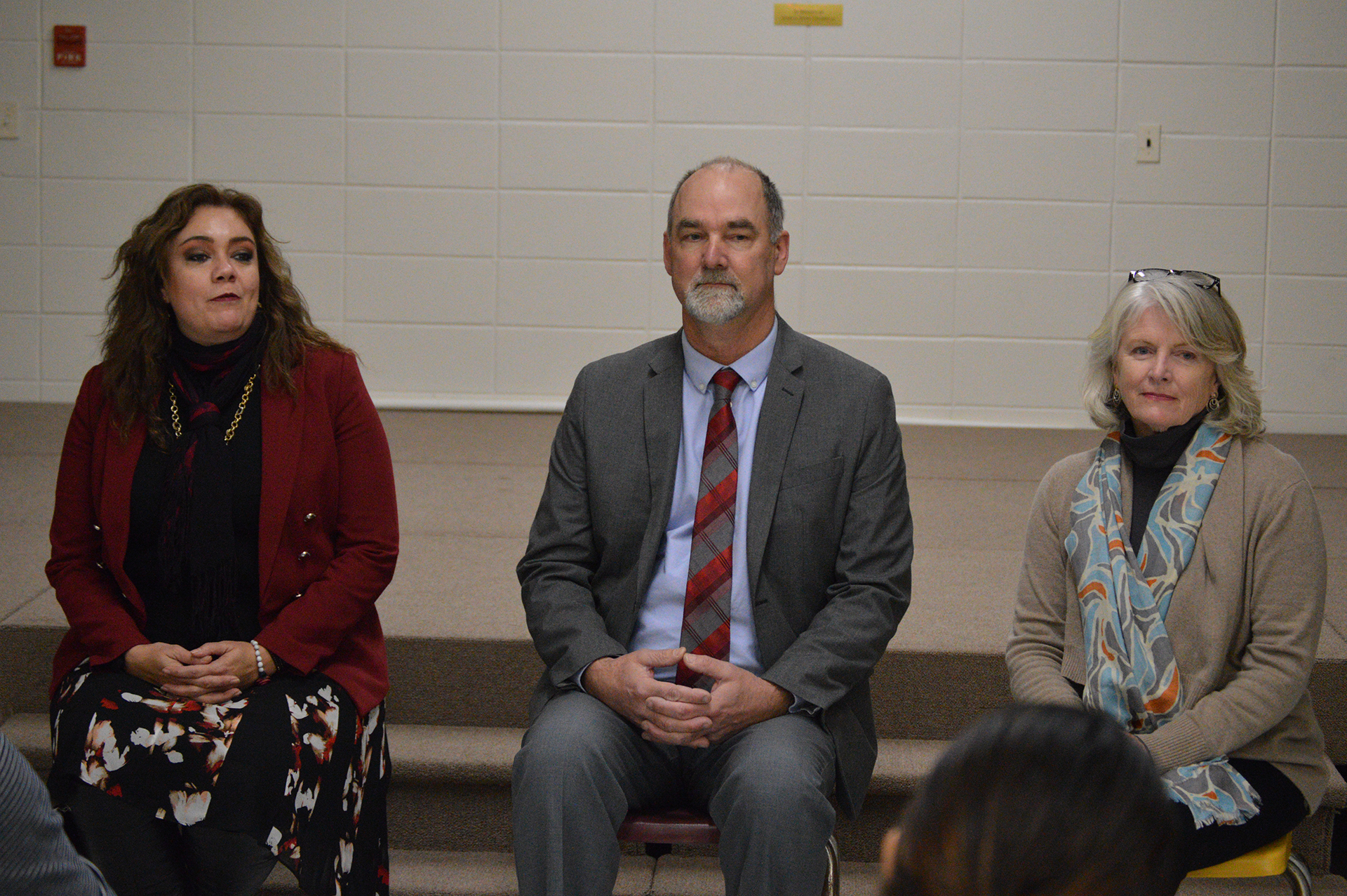Fear In Montauk’s Latino Community

At a gathering prompted by anger over the death of a Colombian man who was struck and killed by an alleged drunk driver October 30, East Hampton Town Supervisor Peter Van Scoyoc and Councilwoman Sylvia Overby met with Montauk Latino community members at St. Thérèse of Lisieux Catholic Church in Montauk Tuesday evening, December 3.
The meeting, which was arranged by Organización Latino Americana’s Eastern Long Island branch and lasted over 90 minutes, covered an array of subjects, starting with what some see as bias at the town’s justice court.
Van Scoyoc and Overby pledged to the audience of about 20 that they would work on improving communication between the town board and the Latino community. “We are here to listen,” Overby said.
The meeting was held at St. Therese’s Parish Center and not at Town Hall because of fear in the immigrant Latino community of being exposed in a public place, several participants that night said. They also said that that the palpable fear in the community suppressed that evening’s turnout. Holding future meetings at the Montauk School was briefly discussed, but it was clear that those present felt much more at ease on church property, as opposed to the public school.
That fear, the town board members were told, is not just relegated to those who are in the country without legal documentation. Even immigrants who have since become citizens feel intimidated. One woman said, in Spanish, “Many people, members of our community, were invited today. We heard that they weren’t coming because they thought the authorities were going to be here. That is how you can see clearly the fear in our community. It is in our houses. Our homes. Our children. The fear of what could happen to us, especially as immigrants. They are afraid.” Ana Kestler was the court-certified translator.
That only two members of the town board attended the meeting was done a specific reason: If three of the five members of the board attended, it would have made for a quorum, and the meeting would have become an official town board meeting, requiring the presence of a town attorney and the town clerk, as well as the recording of speakers’ names.
The goal on December 3 was something much more informal.
“We reached out to the town board,” said Minerva Perez, the executive director of the OLA’s Eastern Long Island chapter. “There were a lot of questions and concerns about the death of John James.”
John James Usma-Quintero, 28, was riding his bicycle on the northbound shoulder of Flamingo Road, up the long, steep hill shortly after sunset October 30 when he was struck and killed by an allegedly drunk driver, Lisa Rooney, 30, of Montauk. Rooney’s 2019 Chevrolet Silverado pickup continued a couple hundred feet before it smashed into a guardrail near the crest of the hill, according to the police. Rooney, who is
the daughter of state supreme court justice Bruna DiBiase, is due back in East Hampton Town Justice Court Wednesday, December 11, after spending a month in a drug and alcohol rehabilitation facility.
“Her parents are very important people. That is what the community is thinking,” said Carlos, who only gave his first name. “Many Americans who were born here told me if that happened to them and they were the ones driving, they would still be in jail.” He asked the supervisor, “What have you done about this case? What exactly do you know about this case?”
Van Scoyoc explained that Police Chief Michael Sarlo could not attend to explain the details because the case is still under investigation. He said it is likely going to take time, months, maybe longer, before any upgraded charges can be brought, if warranted.
It was Rooney’s release from custody on October 31 on $1000 bail that angered many in the community, and in the room, December 3.
One speaker said he understood East Hampton Town Justice Lisa Rana’s reasoning behind setting the $1000 amount. Rana was doing so because setting bail at any amount will soon be eliminated in all alleged drunken driving cases in New York state. Still, he said, it seemed unfair. Another speaker said that the low bail amount caused members of the Latino community to look back at past bail practices in East Hampton Town Justice Court, in which bail was set at $8000 or $10,000 on Latinos in DWI cases where there were no injuries reported.
One man said, “We trust the police officers here. It took a while to build that bridge because we came from a society in Latin America where we did not trust our police officers. They really became a community that we trust. We like them. We don’t doubt them. But with the court, it is unbelievable. It’s so sad. What happened?”
He continued: “We feel like Montauk, East Hampton, is our town. Why this case is so important is that somehow, we must trust. For an immigrant to go face a judge, even for a parking ticket, is very, very intimidating. Facing a judge when you feel that there is a little [bit] of racism is terrifying. That is why this case is so important. What are we going to do? How are we going to regain trust in our court?”
The idea of the community meeting with the two town justices, Steven Tekulsky and Lisa Rana was advanced, but Van Scoyoc cautioned that, because they are part of the judicial branch of local government, there would be many matters on which they would not be able to comment.
Van Scoyoc said that back in 2014-2015, a Latino advisory committee had been set up to improve communication between the Latino community and the town board. It ended in 2016, after the presidential election.
The supervisor encouraged community members to reach out to him and other board members. He said his door is always open.
Those words were good news to Adriana Cardona, a 30-year Montauk resident. She told the board members, “I think the first step towards getting better at communicating with each other is that — letting us know. I had no idea that you can make an appointment to talk to you or to talk to any other board member. That’s the first step: to let the Latino community know that that we can reach out to you if we need to. Communicate with you. I didn’t know that. I think a lot of people didn’t know that.”
Overby told Cardona, “Well, you’re the messenger.”
Other serious issues were broached, including wage theft from immigrants and rental exploitation. But it was Usma-Quintero’s death that was the main topic. Cardona said, as the meeting broke up, that when Rooney’s November court date was adjourned because Rooney was in rehab, no one notified the victim’s family. “It all adds up to the feeling of not being fair.”
t.e@indyeastend.com


